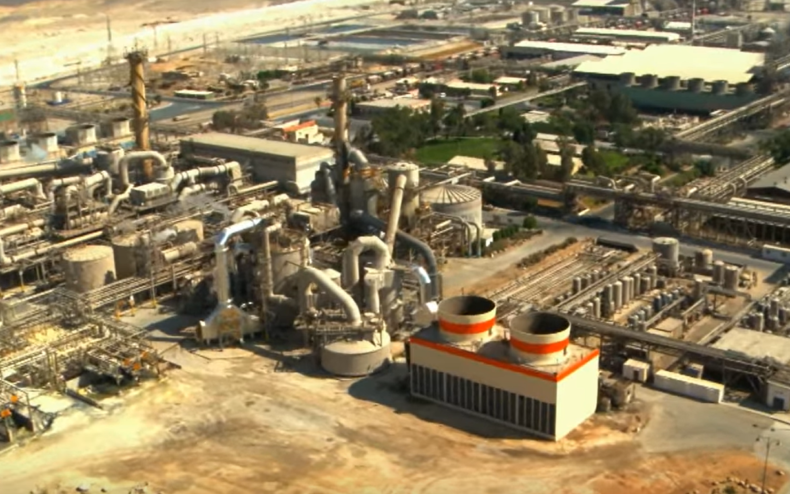In the recent index, a phosphate mining facility and two oil refineries ranked as the worst environmental violators according to the Environmental Protection Ministry.
Source: YWCT
ICL Rotem, previously known as Rotem Amfert Negev Ltd, operates within the southern region of Israel, extracting phosphate rock from deposits located in the Negev desert. In the 11th annual ranking encompassing the year 2021, this company received the distinction of having the most substantial adverse environmental influence. It was identified as the enterprise with the highest negative environmental footprint on the list.
ICL Rotem’s ascendancy to the top spot on the list was the direct result of its continuous disregard for established legal norms and regulatory guidelines from 2019 through 2021. The accumulation of repeated violations underscored the company’s consistent failure to align with crucial environmental standards, ultimately leading to its prominent placement in this unfavorable ranking. Moreover, the company’s standing as the second-worst performer in both 2020 and 2019 served as a striking testament to its ongoing history of subpar environmental practices. This persistent pattern of non-compliance reflects a troubling trend that raises concerns about its commitment to environmental responsibility and sustainability.
During the year 2021, ICL Rotem, a subsidiary of the ICL group, found itself subject to an administrative order due to infractions related to the discharge of wastewater, inadequate infrastructure, and the release of excessive emissions into the atmosphere. These violations highlighted the company’s failure to properly manage its environmental impact, prompting regulatory intervention. The issuance of the administrative order underscored the significance of addressing these concerns and the need for corrective measures to prevent further harm to the environment.
Source: YWCT
Omitted from the current allocation of points is the 2017 incident involving the structural failure of a containment wall surrounding a phosphate holding pool. This catastrophic event, resulting from the byproduct of fertilizer production, led to the discharge of around 100,000 cubic meters of acidic water and pollutants into the Ashalim Stream located in the southern region of the country. The aftermath of this incident witnessed the loss of wildlife and inflicted lasting harm to the ecosystem, despite not factoring into the current evaluation process.
Examining a comprehensive list of 45 corporations with public ownership and government connections, as well as an additional 123 industrial plants, the rankings stem from meticulous assessments of emissions data voluntarily submitted by these entities to an online Environmental Emissions Register over the course of the year. This dataset encapsulates discharges of pollutants into the atmosphere, water bodies, and soil. Complementing this information are records of legal violations uncovered during official oversight examinations, strategies for handling waste and perilous substances, and the geographical proximity of operations to residential neighborhoods and aquatic environments. The synthesis of these intricate factors serves as the foundation for the final rankings.
Source: Globes English
Ironically, Rotem Zin, a sibling enterprise of Rotem, emerges as the frontrunner among firms that have demonstrated enhancement since 2020 within a particular segment. This category commends factories for endeavors aimed at bolstering their environmental records beyond obligatory mandates. These efforts encompass the establishment of environmental management systems and voluntary reporting on ecological facets.
In the most recent compilation of environmental transgressors, Rotem takes the unenviable lead, closely trailed by established Haifa and Ashdod oil refineries located in northern and southern Israel, respectively. Notorious for their recurring violations, these refineries occupy the second and third spots. In the fourth place stands Carmel Olefins, a manufacturer of polypropylene and polyethylene for the plastics industry. Securing the fifth position is the Alcon Recycling Center, a facility specializing in the treatment of industrial wastewater. Occupying the sixth rung on this ignominious ladder is the Leviathan natural gas distribution network, operated under the umbrella of a Delek Group subsidiary. This ranking follows incidents involving the discharge of pollutants into the sea and the excessive utilization of the Leviathan processing platform’s flare system to burn off surplus gas. The collective presence of these entities underscores the pressing need for vigilance and reform in environmental practices across various sectors.
Source: ICL Group Sustainability
In the current panorama of environmental assessments, the Dan Region Wastewater Treatment Plant, commonly known as Shafdan, attains the seventh position due to its connection with sludge pollution. Immediately trailing Shafdan is Gadiv, a subsidiary of the Bazan petrochemical conglomerate, similar to Carmel Olefins. Occupying the ninth and tenth slots are the Orot Rabin power station situated in central Hadera and the Rahat wastewater treatment plant located in the southern Negev region.
Remarkably, all establishments featured within the top 10 ranking have been found in breach of environmental regulations in some capacity, as elucidated by officials from the Environmental Protection Ministry during a press briefing.
It’s noteworthy that the roster of the most egregious violators includes five wastewater treatment plants within the top 20 positions.
Within the category of deteriorated performance since 2020, Tabib, a company specializing in comprehensive waste solutions, takes the lead, followed by the Orot Rabin power station. This evolving landscape of rankings underscores the ongoing efforts required to address environmental issues across a diverse spectrum of industries.













